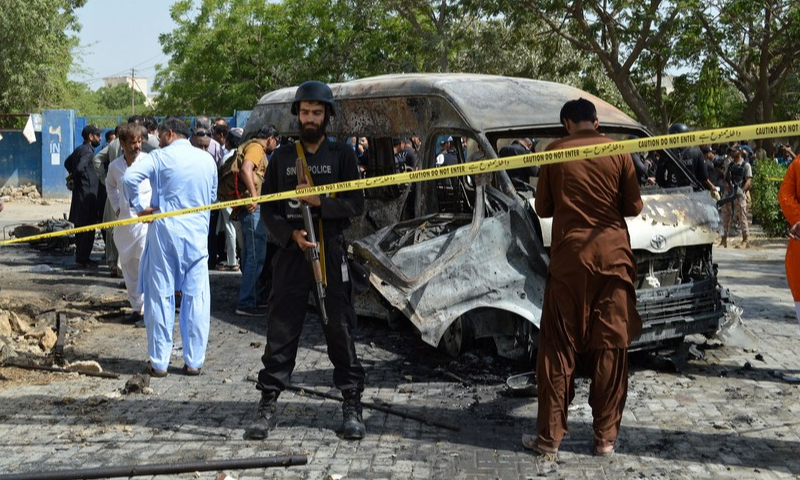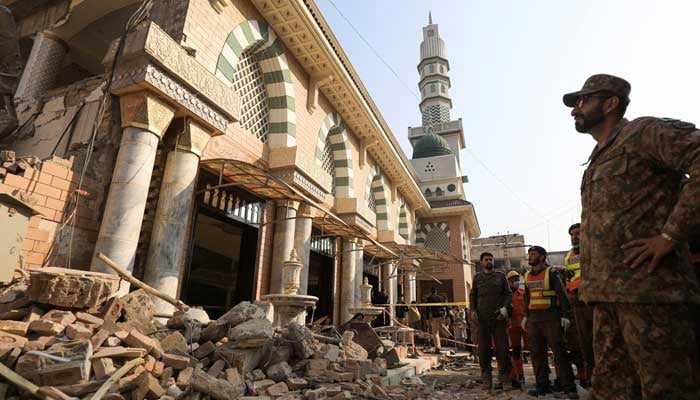Terrorism has plagued Pakistan, resulting in significant loss of human lives, political instability, social unrest, and economic turmoil. Over seventy thousand lives, including security personnel, have been lost, and the economic toll amounts to $123 billion during the last two decades in the war against terrorism. Despite military operations against terrorism, challenges persist due to the involvement of hostile neighbours and internal sympathies for religious fundamentalists and non-state actors. Pakistan, once poised for democracy and development, became a frontline ally in the global war on terror, engaging in a proxy war for the US and its allies. It continues to endure the burden, grappling with recurrent attacks targeting its security forces, civilians, developmental projects such as the China-Pakistan Economic Corridor (CPEC), and institutions.
The recent terrorist attacks across Pakistan, including the assault on the PAF Mianwali Training Air Base, suicide attacks on Chinese nationals at Besham, and a foiled terror plot at Gwadar port, indicate the persistent threat posed by terrorism. These incidents, occurring in Balochistan and Khyber Pakhtunkhwa provinces were driven by ethnic, sectarian, and religious motives.
Despite extensive counter-insurgency efforts, including infrastructure expansion and border fencing with Afghanistan and Iran, surprise attacks on security forces and civilians continue. In 2023, terror incidents spiked by 43 per cent, resulting in significant casualties. This trend continued in 2024, with over 148 attacks so far.

Aggressive counter-insurgency measures by Pakistan pushed militant groups into Afghanistan, worsening regional security concerns. Pakistan’s hopes for support from the Afghan Taliban have been dashed, as elements within the Afghan government allegedly back groups hostile to Pakistan, fuelled by proxy assistance from India. This persistent terrorism drains resources and hampers progress in social, economic, and political spheres, despite Pakistan’s significant sacrifices.
Targeting Chinese nationals poses a significant obstacle, threatening the progress of the multi-billion-dollar CPEC and creating a severe economic crisis in Pakistan.
In response, Pakistan has taken a firmer stance towards Iran and Afghanistan, while adopting more assertive measures against groups like the Balochistan Liberation Army (BLA) and Tehrik-e-Taliban Pakistan (TTP) within its borders. Notably, Pakistan conducted a retaliatory strike against Baloch militants inside Iran on 18 January 2024 and has carried out multiple operations inside Afghanistan, including a recent one on 18 March 2024 targeting TTP commanders. These actions were prompted by an attack on a border post that resulted in the loss of seven Pakistani soldiers, including a lieutenant colonel and a captain. The sacrifices of these brave soldiers further strengthen the nation’s resolve to combat terrorism and ensure the safety and security of its people.
Targeting Chinese nationals poses a significant obstacle, threatening the progress of the multi-billion-dollar CPEC and creating a severe economic crisis in Pakistan. Prime Minister Shehbaz Sharif has responded decisively, personally overseeing heightened security measures for Chinese nationals. These incidents occur at a critical juncture as Islamabad’s newly elected government seeks Beijing’s support to boost investments in the country. During his visit to Dasu following the Besham attack, Prime Minister Shehbaz Sharif reassured Chinese workers of the government’s unwavering commitment to their security. He has directed counter-terrorism agencies to provide regular security updates regarding Chinese nationals, reaffirming the government’s commitment to safeguard crucial partnerships and investments.
 The economic toll of terrorism in Pakistan is massive. Over the past two decades, the nation has suffered immense losses amounting to billions of dollars. The direct costs include damaged infrastructure, loss of productivity, and increased security expenditures. Indirect costs, such as loss of investors’ confidence, decreased tourism, and disruption of business activities, further exacerbate the economic impact. One of the most significant economic repercussions of terrorism in Pakistan is the erosion of investor confidence and the reluctance of foreign businesses to invest in the country. The uncertainty and instability created by frequent terrorist attacks deter both domestic and foreign investors, hampering economic growth and job creation.
The economic toll of terrorism in Pakistan is massive. Over the past two decades, the nation has suffered immense losses amounting to billions of dollars. The direct costs include damaged infrastructure, loss of productivity, and increased security expenditures. Indirect costs, such as loss of investors’ confidence, decreased tourism, and disruption of business activities, further exacerbate the economic impact. One of the most significant economic repercussions of terrorism in Pakistan is the erosion of investor confidence and the reluctance of foreign businesses to invest in the country. The uncertainty and instability created by frequent terrorist attacks deter both domestic and foreign investors, hampering economic growth and job creation.
Pakistan remains steadfast in its fight against terrorism. The government has implemented various measures to enhance security, strengthen law enforcement agencies, and improve intelligence coordination.
The tourism industry, once a thriving sector with immense potential, has been particularly hard hit by terrorism. The perception of Pakistan as an unsafe destination has deterred tourists from visiting the country, depriving the economy of much-needed revenue and employment opportunities.
Moreover, the government’s efforts to combat terrorism entail substantial financial costs. Investments in security infrastructure, intelligence gathering, and counter-terrorism operations divert resources away from critical social and economic development initiatives, perpetuating a cycle of underinvestment and underdevelopment.
The economic impact of terrorism extends beyond direct financial losses. It also affects human capital development, as resources that could have been allocated to education, healthcare, and poverty alleviation are redirected to security-related expenses. This hampers the long-term socio-economic progress of the nation, promoting poverty and inequality.
Despite these challenges, Pakistan remains steadfast in its fight against terrorism. The government has implemented various measures to enhance security, strengthen law enforcement agencies, and improve intelligence coordination. Additionally, efforts to address underlying socio-economic grievances and promote inclusive development are underway to mitigate the root causes of terrorism.
 The current political leadership and security forces are united in their resolve to eradicate the menace of terrorism from our soil, ensuring peace and economic stability. International cooperation and support are crucial in addressing the new wave of terrorism in Pakistan and its economic impact. The global community must stand in solidarity with Pakistan, providing assistance in terms of intelligence sharing, capacity building, and counter-terrorism financing. Furthermore, diplomatic efforts to address regional conflicts and address cross-border terrorism are essential for long-term stability and prosperity.
The current political leadership and security forces are united in their resolve to eradicate the menace of terrorism from our soil, ensuring peace and economic stability. International cooperation and support are crucial in addressing the new wave of terrorism in Pakistan and its economic impact. The global community must stand in solidarity with Pakistan, providing assistance in terms of intelligence sharing, capacity building, and counter-terrorism financing. Furthermore, diplomatic efforts to address regional conflicts and address cross-border terrorism are essential for long-term stability and prosperity.








